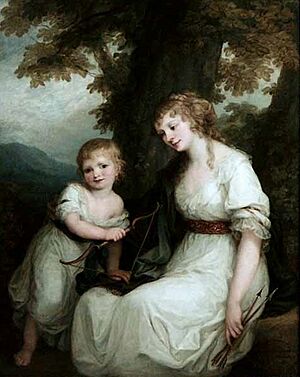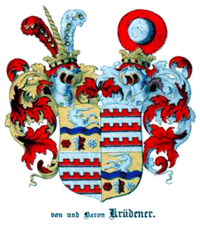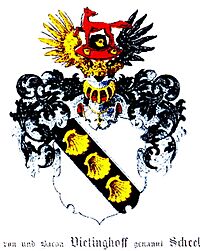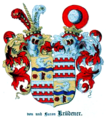Barbara von Krüdener facts for kids
Quick facts for kids
Barbara Juliane von Krüdener
|
|
|---|---|
| Freifrau von Krüdener | |

Baroness von Krüdener and her son Paul, painted in 1786 by Angelica Kauffman
|
|
| Coat of arms |   |
| Born | Beate Barbara Juliane Freiin von Vietinghoff genannt Scheel 22 November [O.S. 11] 1764 Riga, Riga County, Riga Governorate, Russian Empire |
| Died | 25 December [O.S. 13] 1824 Belogorsk, Taurida Governorate, Russian Empire |
| Noble family | Vietinghoff Krüdener (by marriage) |
| Spouse(s) | Baron Burckhard Alexius Constantin von Krüdener |
| Issue | 2 |
| Father | Baron Otto Hermann von Vietinghoff genannt Scheel |
| Mother | Countess Anna Ulrika von Münnich |
Barbara Juliane von Krüdener (born Beate Barbara Juliane Freiin von Vietinghoff genannt Scheel; November 22, 1764 – December 25, 1824) was a famous Baltic German writer and religious thinker. She was known for her strong spiritual beliefs and for influencing important people, including Tsar Alexander I of Russia. Her ideas spread across Europe, affecting different Christian groups.
Contents
Early Life and Family Background
Barbara Juliane von Krüdener was born in Riga, which was part of the Russian Empire at the time. Her family was very wealthy and important.
Her Father's Influence
Her father, Baron Otto Hermann von Vietinghoff, was a rich and powerful man. He had served as a colonel in wars and was a key advisor for Livonia. He was also a leading freemason, which meant he had modern, logical views for his time.
Her Mother's Background
Her mother, Countess Anna Ulrika von Münnich, came from a noble family too. Her grandfather was a famous Russian field marshal. Unlike her husband, Anna Ulrika was a very strict Lutheran. Barbara Juliane was one of five children in this wealthy family.
Education and Early Beliefs
Barbara Juliane learned French and German from a young age. French helped her read works by famous thinkers like Voltaire. Her parents, like many nobles, admired French culture. This focus on French ideals seemed to be more important than religious studies in her early life. Even though it's sometimes debated, her family was definitely of the Lutheran faith.
Her Marriage and Search for Meaning
As a young woman, Barbara Juliane was considered beautiful and was heir to her parents' fortune. This led to many marriage proposals. Her parents arranged for her to marry a local baron, but she didn't want to. She prayed for a way out, and a case of measles made her less attractive, causing the baron to withdraw his proposal. This made her believe she had a special connection with God.
Later, she married Baron Burkhardt-Alexis-Constantine Krüdener. He was 16 years older, well-educated, and a respected diplomat. He was favored by Catherine II, just like her father. However, he was a serious and quiet man, while Barbara Juliane loved fun and attention. This difference in their personalities, along with her spending habits, caused problems in their marriage.
She hoped her marriage would bring her happiness and adventure, but she felt emotionally unfulfilled. She even wrote a book, Valérie, where she described her husband as a romantic hero, which was different from how he really was.
In 1784, she had a son named Paul. Her husband became an ambassador in different cities like Venice, Munich, and Copenhagen. In 1787, her daughter Juliette was born. After this, Barbara Juliane's health suffered, and she traveled south for recovery.
She continued to travel, visiting Riga, St. Petersburg, and Switzerland. Her husband became an ambassador in Madrid and later in Berlin. She joined him in Berlin, but she found the court life difficult. Financial problems continued, and her husband's position became uncertain after the death of Tsar Paul. She left Berlin and never saw her husband again; he died in 1802.
Her Spiritual Journey and Influence
After the Napoleonic wars, many people were looking for new ideas, especially in religion. Barbara Juliane's spiritual journey deeply influenced others, including the Swiss Reformed Church and the Moravian Church. Her ideas even affected Tsar Alexander I of Russia. She helped shape the religious side of the Holy Alliance, a major agreement between European powers.
A Turning Point in Riga
In 1804, while in Riga, something shocking happened that changed her life. A man she knew collapsed and died at her feet while greeting her. This event deeply affected her. She found comfort and guidance from her shoemaker, who was a follower of the Moravian Brethren, a Christian group. She felt she had "found peace," but her health remained fragile.
Meeting Prophets and New Beliefs
She met Queen Louise and a peasant named Adam Müller who claimed to have prophetic visions. At this time, many believed that Napoleon was the Antichrist and that the world was nearing its end. This belief, called Chiliasm, was common among different social classes. People thought a leader from the north would defeat the Antichrist, and Christ would return to rule for a thousand years. This meeting shaped Barbara Juliane's religious path.
She visited the Moravians and then went to learn from Heinrich Jung-Stilling, a spiritual teacher. She then sought out a pastor named Jean Frédéric Fontaines who was known for prophesying. She stayed with him for two years.
Visions and Colonies
Fontaines had a prophetess named Marie Gottliebin Kummer in his home. Her visions became very important to Barbara Juliane, strengthening her belief in the coming millennium and her own mission to announce it. Her high social standing, generous giving, and passionate speeches greatly impressed the local people. In 1809, she helped create a colony for those who believed the Lord was coming. Many peasants sold their belongings and followed her to Württemberg. However, the government soon broke up the settlement.
She continued her travels, preaching and giving to charity. Her presence often led to many people having visions and making prophecies. In 1811, a comet appeared, which many saw as a sign of the approaching end of the world.
Her Connection with Tsar Alexander I
In 1815, Barbara Juliane was in Germany, telling peasants to sell everything and prepare for what was to come. Emperor Alexander was nearby. That night, she met him. The Tsar had been reading his Bible and felt her arrival was an answer to his prayers. For three hours, she spoke about her beliefs, and the powerful Tsar was deeply moved, saying he had "found peace."
The Tsar asked her to follow him to Heidelberg and then to Paris. She stayed next to the imperial headquarters, and every evening, the Tsar would join her and her companion, Henri-Louis Empaytaz, for prayer meetings. It seemed that her spiritual ideas were now influencing the leaders of Europe. Many important people came to her gatherings.
The Holy Alliance
The idea for the Holy Alliance grew from these religious meetings. On September 26, the rulers of Russia, Austria, and Prussia signed this important agreement, hoping to bring a new era of peace. Barbara Juliane claimed she suggested the idea, and that Alexander even showed her the draft for her approval. This is likely true, though the Tsar later regretted her talking about it openly.
Her influence began to lessen when Marie Kummer, the prophetess, asked the Tsar to fund her religious colony. Alexander said he had heard too many such requests before. Barbara Juliane's influence was shaken, but the Tsar still gave her a passport to Russia. She never saw him again.
She left Paris in October 1815. She continued to travel, proclaiming her mission and performing what people believed were miracles. She convinced followers to sell their possessions. Crowds of needy people gathered around her, supported by the money she gave away. She became a problem for authorities and was expelled from several places.
In 1818, she returned to her estate in Livonia. The Tsar had opened the Crimea for German and Swiss settlers, and her son-in-law went there to help establish new colonies. In 1820, Barbara Juliane finally went to St. Petersburg. She was there when the Greek War of Independence began. She urged the Tsar to fight for Christianity. However, Alexander was no longer influenced by her and politely asked her to leave St. Petersburg.
In 1823, the death of her companion, Kellner, was a great blow to her. Her health was failing. She traveled to the Crimea, where she died on December 25, 1824.
Works
- Valérie, ou, Lettres de Gustave de Linar à Ernst de G…, Paris, Henrichs, 1804.
- Écrits intimes et prophétiques de Madame de Krüdener, Paris, Éditions du Centre national de la recherche scientifique, 1975.
- Le Camp de Vertus, ou la Grande revue de l'armée russe, Lyon, Guyot frères, 1815.
Images for kids
 | Victor J. Glover |
 | Yvonne Cagle |
 | Jeanette Epps |
 | Bernard A. Harris Jr. |



